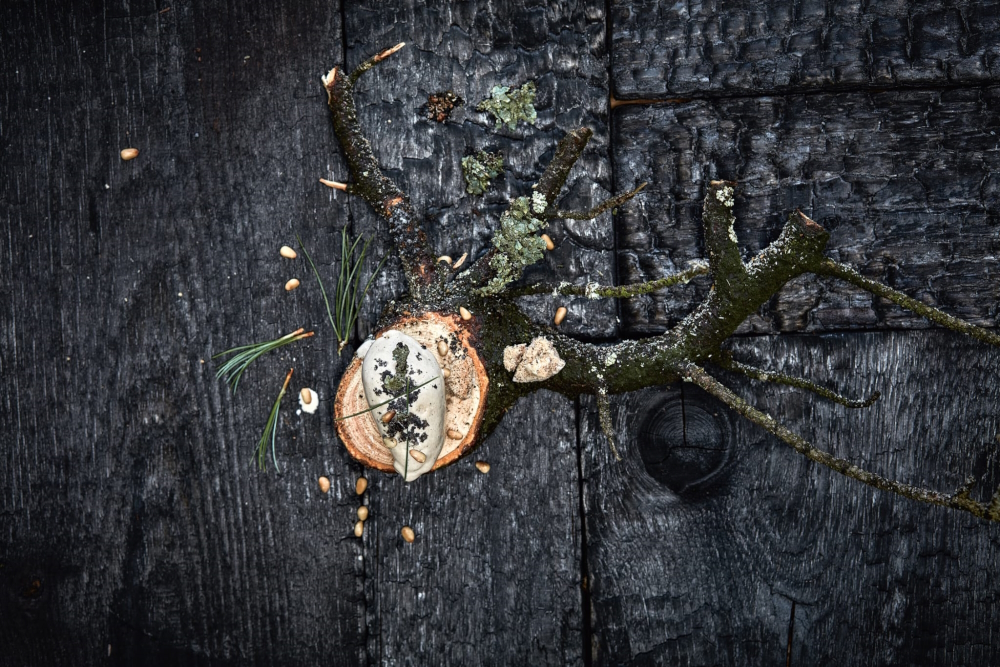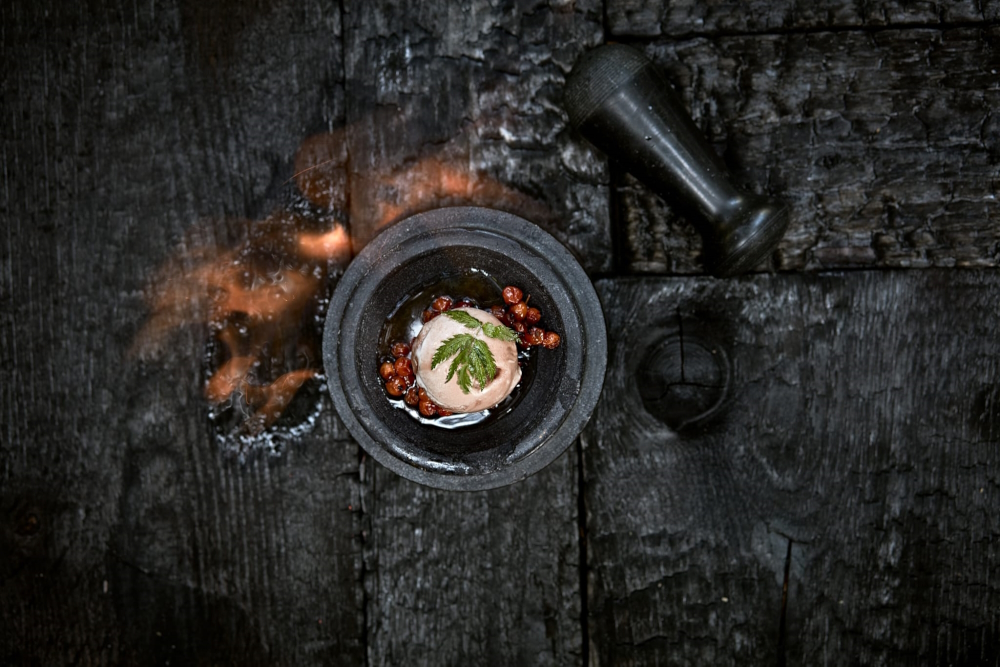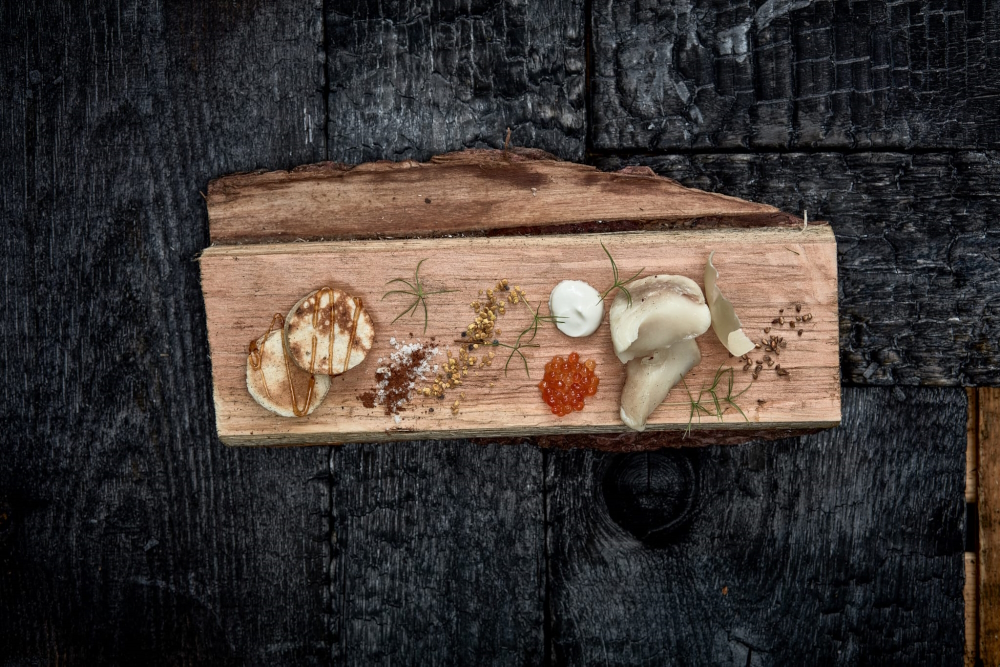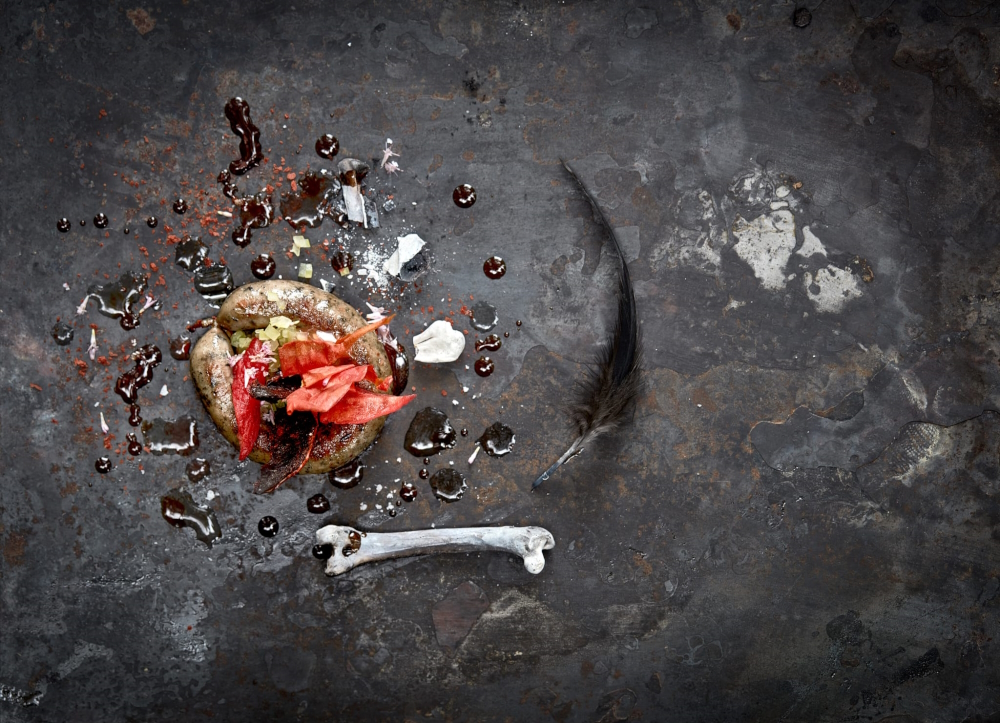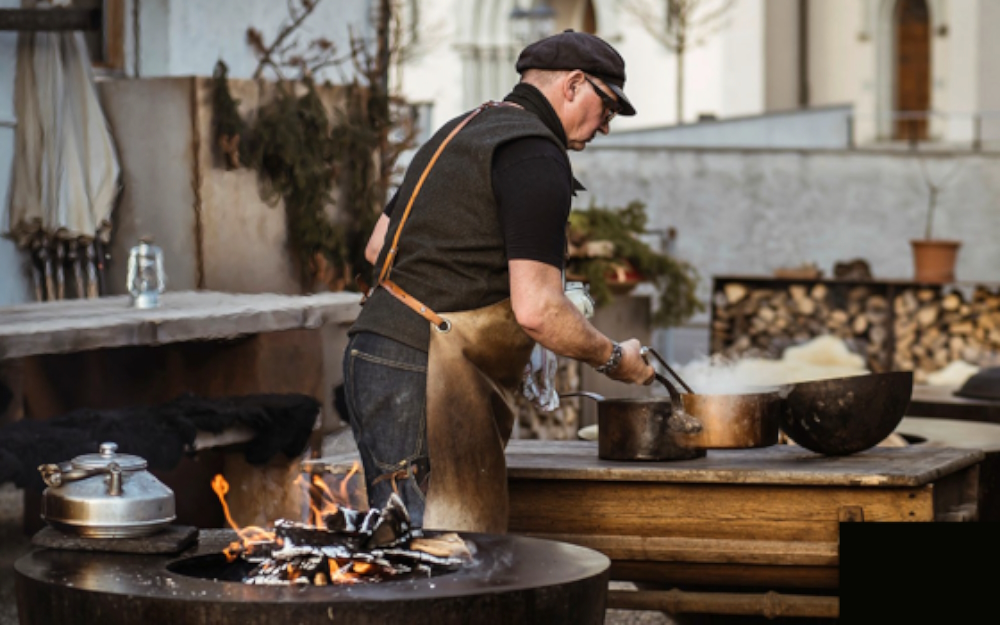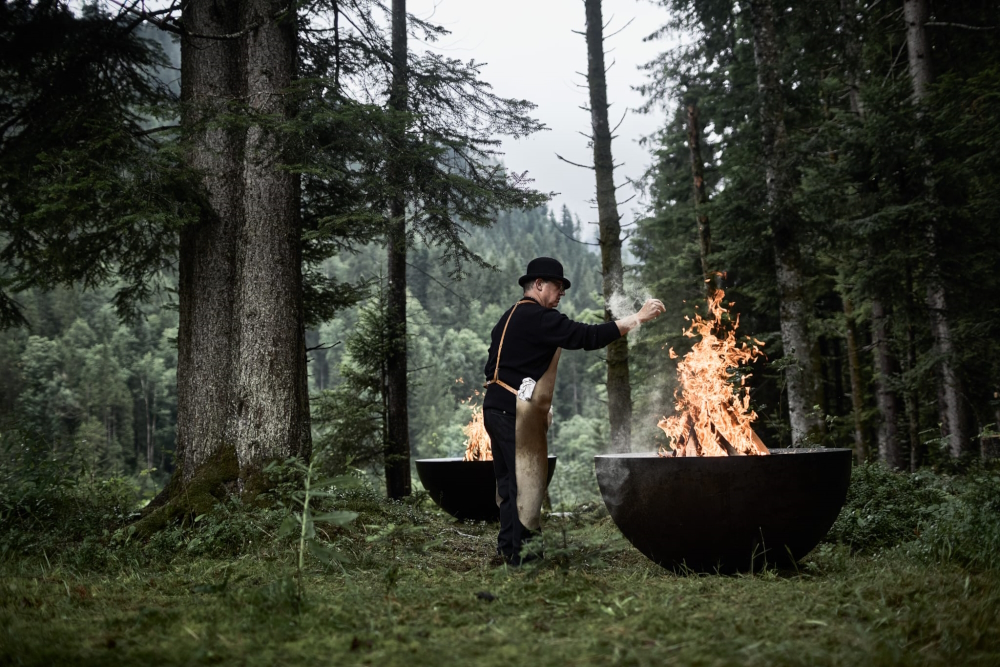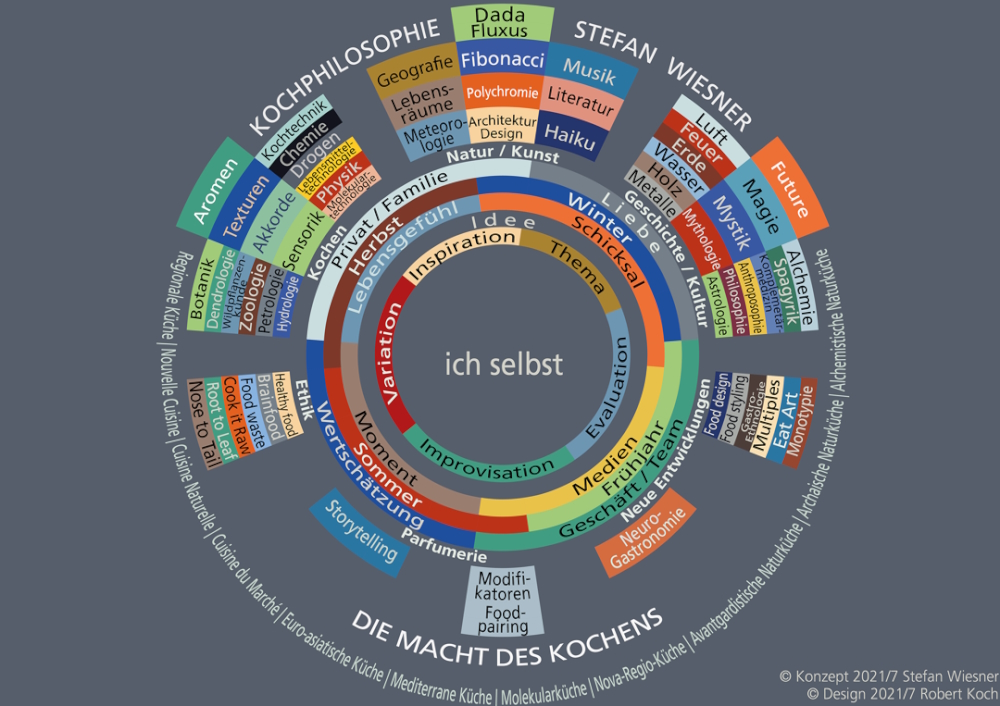Stefan Wiesner
awarded alchemistic avant-garde „natural chef“
Switzerland
Ash, (young) leaves, iron ore, ferns, lichen, gold, granite, resin, hay, wood, leather, moss, bark, rust, silver, tobacco oil, pine needles, peat, sawdust, stones, violets - thanks to such always purely ecological ingredients, the "Paracelsus in the kitchen" (qlocktwo.com) creates new, maximum sensory experiences and became a pioneer of experimental preparation styles. Because of his excellent alchemical avant-garde natural cuisine, he is not only nicknamed "the witcher", but also received a star in the Guide Michelin as well as 17 Gault Millau points. His creations and career demonstrate: this Swiss is an exceptional, innovative as well as down-to-earth chef and, despite many defeats, has never given up!
Stefan Wiesner
awarded alchemistic avant-garde „natural chef“
Switzerland
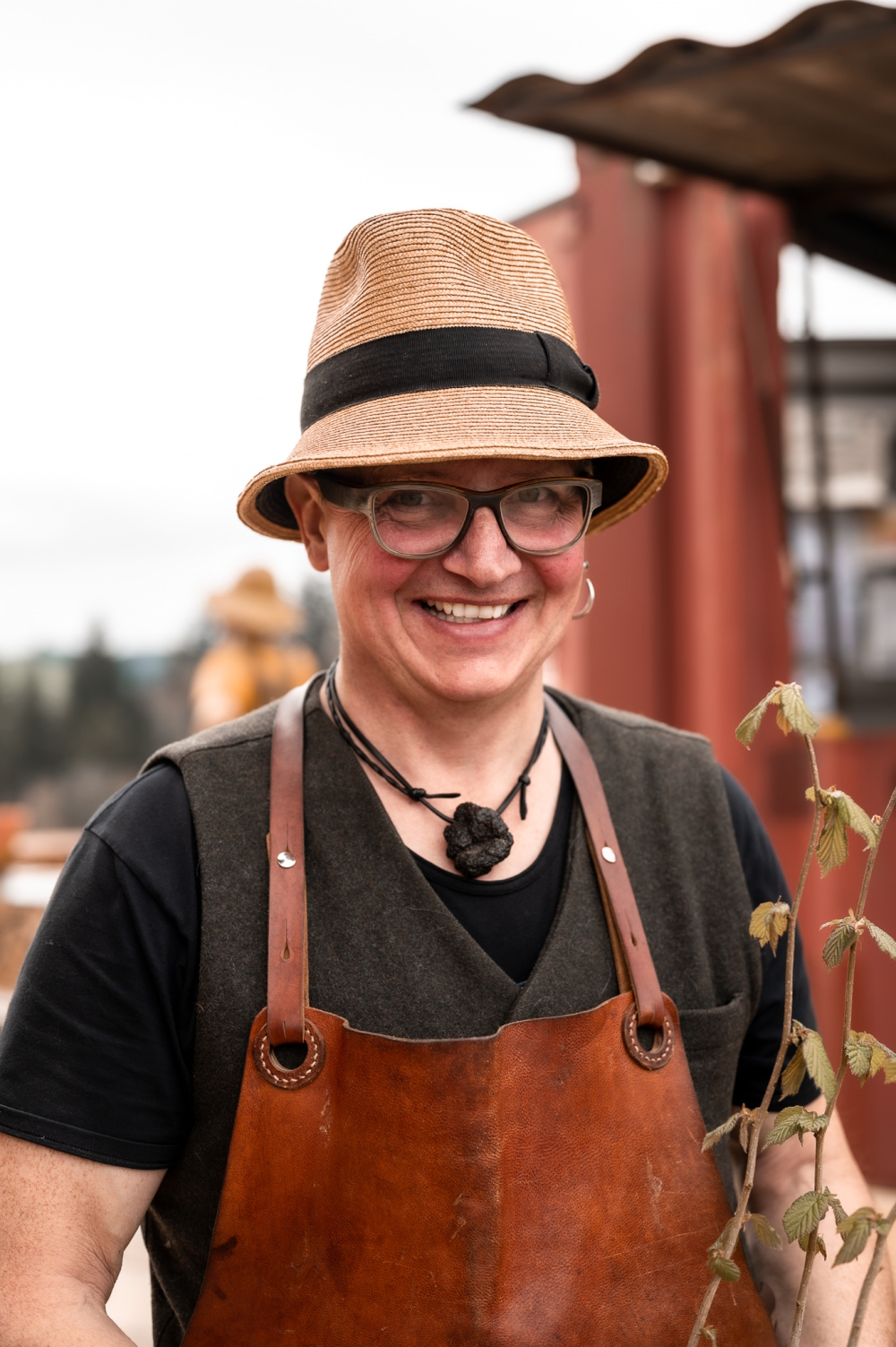
"Success is the ability to go from one failure to the next with no loss of enthusiasm." Stefan Wiesner is living proof that Winston Churchill's famous quote is true. He has not let it get him down - no matter how adverse the circumstances. And it has often been problematic for the radical "regional revolutionary" (jagdfakten.at). To this day, some of the essential restaurant sharpshooters responsible for the popularity judge him as a nutcase; they are opposed by the group of his fans. Then there is another aspect in business: visions can often only be realised with the financial support of investors. But they, in turn, have their own ideas. This means a constant balancing act between dreams/plans and expectations/earnings.
Like the virgin to the child, Stefan Wiesner (* 16 October 1961 in Escholzmatt, Canton Lucerne) became a restaurateur. When his father took early retirement in 1989 and left him the Gasthof Roessli, the junior unceremoniously trained as a chef, while his wife Monica first learned to be a cook and then a waitress. "We had very little money for a long time, and more out of necessity than anything else, we helped ourselves to what nature had to offer," he revealed in an interview with transgourmet.ch. "That was the beginning of his natural cuisine. Food is valuable to him. Even more: "Nature is in the food." But that was not enough for Stefan Wiesner. Fascinated by the thought of what a chef can do with food - trigger joy or sadness, create warmth or coolness, preventively keep people healthy or make them healthy and much more - Stefan Wiesner looked at what different cooking techniques can do." Mindful of his resolution that nothing should be wasted (nose-to-tail) and that all edible plant parts (root-to-leaf) should also be used, he developed his archaic, avant-garde menus.
"Cooking is art. And in art, everything is allowed," Wiesner is quoted on chef-sache.eu. The menu shows what is meant: raw peat with chocolate and sea salt, chamois ragout, eel smoked with tree mushroom and Norway spruce, plus shoots of Norway spruce, cone core and Norway spruce cambium. The special ingredients have their flavour secrets extracted by fermentation or a rotary evaporator. "Our dishes link pleasure with a consciousness of philosophical thought," Wiesner says, "cooking is ethics, ecology, culture, architecture, aesthetics and art."
The craftsman, who is enthusiastic about ancient knowledge, architecture, literature, music, mythology and philosophy, rightly sees himself as an artist. Exemplary of his highly individual creativity is that the gourmet compositions he serves up have translated, for example, Bauhaus, Paul Cézanne's paintings, Joseph Beuys' works, fashion by Hugo Boss, Alexander Scriabin's synaesthetic composition Klaviatura or Patrick Suesskind's novel Perfume as culinary expeditions into the wide world of textures and aroma chords.
Despite all the awards, Gasthof Roessli closed on 18 December 2022. The owner, who had won an ICD award as an "innovative trendsetter", had already sold it when it became clear that the planned hotel with gourmet restaurant plus training centre for chefs as well as its own cheese dairy, sausage factory and brewery would be too expensive and the detailed planning was therefore stopped.
Stefan Wiesner & Co. opened Mysterion on 13 April 2023. In the former seminar hotel, an hour's drive from Lucerne, the father of two grown-up children has his place of work since then. There, the man who prefers to eat Belgian fries baked in beef fat with homemade mayonnaise "makes the surrounding landscape eatable" (echtessen.de). In addition to regional products, his cuisine draws on what the immediate nature in the UNESCO Biosphere Entlebuch, 1,053 metres above sea level, displays the loner on forays with his dog. After decades of exploring extremes, the highly sensitive experimentalist has arrived at holistic, elementary "Minimal Eat Art" (such as the translation of his youthful memories into dishes).
The two menus offered (because of the solar panels) only at lunchtime (Wednesday to Saturday or by reservation) are made with the four elements of fire, water, air and earth - preferably outdoors on the sprawling terrace at a large cooking, roasting and simmering station, the handmade fire ring by steel sculptor Andreas Reichlin.
The house with 20 guest rooms and a seminar room also includes the nature academy. Courses/workshops, events and culinary internships are offered there. The fact that the owner has always been very interested in imparting knowledge is underlined by his excellent cookbooks: Gold, Wood, Stone: Sensual Sensations from Wiesner's Alchemical Natural Cuisine (2003), Avant-garde Natural Cuisine with an encyclopaedia of flavour combinations (2011), Wurstwerkstatt: Brat- und Siedwürste einfach selber machen (2015) - editions available in German only.
The man who consistently goes his own way knows: "If someone concentrates on what he or she does best and remains true to himself or herself, then it turns out well" (transgourmet.ch).
Stefan Wiesner lives in Escholzmatt, Switzerland.
Interview October 2023
The witcher‘s magic: nature’s ingredients transformed into minimal eat art
INTUITION/IMAGINATION
?: How does intuition present itself to you – in form of a suspicious impression, a spontaneous visualisation or whatever - maybe in dreams?
Dreams are very important and encounters. When someone tells me something that I think is interesting, I want to cook it. I then go pregnant with it and have corresponding thoughts about it. Maybe I then look in books that I own or get, and that's how something comes about.
?: Will any ideas be written down immediately and archived?
Yes, I take notes.
?: How do you come up with good or extraordinary ideas?
I don't know. It's just my type.
?: Do you feel that new creative ideas come as a whole or do you get like a little seed of inspiration that evolves into something else and has to be realized by endless trials and errors in form of constant developments until the final result?
Of course, we don't have that much time in the kitchen. You could experiment endlessly. I'm just someone who gets to the point. When you cook Bauhaus, for example, it's so varied and goes in different directions. You have to concentrate on colours, shapes and building materials.
?: What if there is a deadline, but no intuition? Does the first fuel the latter maybe?
When I get stuck, I look it up on the internet. Doing research is no longer a problem these days. Answers to questions can be found quickly this way.
INSPIRATION
?: What inspires you and how do you stimulate this special form of imaginativeness?
The imagination I possess is given to me by nature, part of my personality. It is a gift from God. I am dyslexic. And maybe we see things differently than other people. We have a very good imagination. This is also true for me.
?: How do you filter between ideas that are worthwhile pursuing and bad ones that you just let go of?
How you handle it is sometimes a question of intellect - for example, in my cooking projects Bauhaus, Beuys, Scriabin. The themes of Nordic mythology or Paracelsus, on the other hand, are more accessible. But it always depends on the topic. It's quite easy to translate my childhood into food. It's different when we cook Bauhaus with bricks and stones.
?: Does an idea need to appeal to you primarily or is its commercial potential an essential factor?
An idea has to appeal to me alone.
?: Do you revisit old ideas or check what colleagues or competitors are up to at times?
No.
CREATIVITY
?: What time or environment best suits your creative work process — for example, a time and place of tranquility or of pressure? Which path do you take from theory or idea to creation?
I am inspired at any time of day, in any place. Morning, noon, evening. In the car. During walks, during conversations. Through television, newspapers and magazines, books, films, in short, by everything.
If I have something in mind that I would like to realise, it literally comes to me automatically: friends can tell me something about it or I get a suitable book, see an adequate film...
?: What’s better in the realization process — for example, speed and forcing creativity by grasping the magic of the moment or a slow, ripening process for implementation and elaboration?
For the complicated issues, slow, lengthy processes are good, because development for me requires close collaboration with others to communicate to them how I would like it to be. It can sometimes take up to two months to get the result.
The simpler ideas I implement spontaneously, for example on the ring of fire, directly.
?: How important are self-doubt and criticism by others during such a process?
Criticism from others is not important to me. Of course I do have self-doubt, but that concerns me as a person and not the meals. Self-doubt torments those who are sensitive. And I am a delicate little plant, I also have a feminine soul in my masculine personality. This side is palpable and makes it difficult.
?: Is it better to be creative on your own, to trust only your own instincts, or to work in a team?
I used to be a lone wolf and wrote the recipes alone. Nowadays, I involve the cooks in the creation process and we work as a team.
?: In case of a creative block or, worse, a real failure, how do you get out of such a hole?
I experienced failure not in terms of my menus, but in what I wanted to achieve, such as founding and building a technical school/academy. Getting out of such a low spot is difficult. But time heals all wounds, as we all know.
?: Should a creative person always stay true to him- or herself, including taking risks and going against the flow, or must the person, for reasons of commercial survival, make concessions to the demands of the market, the wishes of clients and the audience’s expectations?
As far as my profession is concerned, I can answer the question as follows: In the gourmet sector you can remain stubborn, with so-called country cuisine a different audience is addressed and I have to think differently for economic reasons.
?: How are innovation and improvement possible if you’ve established a distinctive style? Is it good to be ahead of your time, even if you hazard not being understood?
I develop on the basis of the themes I work on. I have interpreted Patrick Suesskind's book Perfume, Joseph Beuys' oeuvre, Tommaso Marinetti's Futurismo movement in food, Dadaism, audhumbla - Nordic mythology, Paul Cézanne paintings, Bauhaus. My philosophy is so strong that the cooking world no longer understands me, or does so only with great difficulty. There are young people in Switzerland for whom I am a role model, because I incorporate nature very strongly into my dishes. They admire me because I am stubborn and go my own way. I am very happy about the positive feedback. However, I am not understood by many of those who call the shots in my industry.
?: When does the time come to end the creative process, to be content and set the final result free? Or is it always a work-in-progress, with an endless possibility of improvement?
I would like to answer the question very personally. I am a bit on resignation and realise that my strength is not enough to move much anymore. It is actually over. The big project with the technical college and so on hasn't been realised. I have to admit to myself that I failed at it. They have also broken me a little. What do I do now? Do I have to give up or can I still keep the joy? The fighting spirit to make something happen is no longer there.
?: Do you have a clue why do you do what you do the way you do it?
I have never thought about this before and therefore cannot answer the question.
SUCCESS
?: “Success is the ability to go from one failure to another with no loss of enthusiasm.“ Do you agree with Winston Churchill’s quote?
Yes, that is the way it is and should be.
?: Should or can you resist the temptation to recycle a ‘formula’ you're successful with?
Just this much: I have designed two knowledge keys as a "success formula" for cooking - one big and one small. They should be part of the curriculum of my technical school project...
?: Is it desirable to create an ultimate or timeless work? Doesn’t “top of the ladder” bring up the question, “What’s next?” — that is, isn’t such a personal peak “the end”?
Good question. Something similar also bothered me for a while when I realised this: I said and did everything I wanted, but was not heard! I wanted to disappear from life. But then I realised that I should be content with what I have. However, I don't need anything anymore, I don't have any desires. My son, who has his workshop as a cutler in the Mysterion complex, was the motivator for me to continue.
MY FAVORITE WORK:
I cannot name a masterpiece of mine. Works come and go. But I am particularly proud of the Wiesner Sausage and the Hay Soup.
The sausage was my father's creation originally. When I was under pressure and had to cook a gourmet course quickly, but didn't have anything in stock, I took the sausage, cooked it with Barolo red wine, added truffles and a little gold, and it was a 'mega-creation'.
And about the 'hay soup': At that time, maybe a roast or a poulard was made with hay, but nobody cooked it for a soup. That's what I did.

